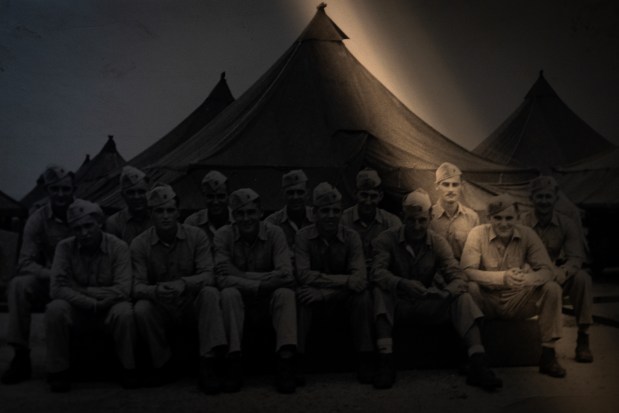Wounded in the shoulder and ordered to retire from combat, Pfc. Delbert Tuttle refused to leave his fellow U.S. Marines as his unit invaded the Japanese-held island of Saipan during World War II.
The son of a central Illinois farmer stayed to run ammunition to front-line troops, then went back again, still under heavy fire. He was wounded a second time while directing tank fire against the enemy.
Tuttle, then 24, showed such extraordinary grit during the bloody battle — one that proved critical to the Allied victory in the Pacific — that it earned him a Silver Star as well as a Purple Heart, which is awarded to those injured or killed in combat.
On a recent fall day, Tuttle’s 71-year-old daughter held her father’s heart-shaped medal for the first time after Illinois Treasurer Michael Frerichs presented it to her during a poignant Oct. 29 ceremony at the World War II memorial in Decatur, her hometown.
Frerichs’ office had preserved the medal in a Springfield vault since October 2018, when a Pekin bank turned it over to the state from an abandoned safe deposit box. Now it was being returned to Tuttle’s next of kin.
Weeping tears of pride, Carolyn Peckham said her parents didn’t share many details about the war, including the bravery her late father showed 80 years ago on Saipan.
“I guess I’m just so emotional because I never knew any of this and I’m just so proud of him,” she told the Tribune. “I knew about the medals but as far as the stories behind them, the acts of heroism, I had no clue.”
The safe deposit box was in the name of Peckham’s brother, Vincent Tuttle, whose whereabouts are unknown. Peckham said she hasn’t heard from him in several years despite her efforts to locate him. She suspects the box belonged to their mother, Lorraine, who died in 2009.
The Illinois treasurer is the state’s custodian of unclaimed property, which includes everything from lost bank accounts and insurance policies to stamps, coins, jewelry, baseball cards and at least one antique sword.
An estimated $2 billion in forgotten cash and stock has been returned to individuals, employers and nonprofits during Frerichs’ three terms, according to his office, including a dozen Purple Heart medals. The treasurer launched a special effort, “Operation Purple Heart,” in late 2021.
On Sunday, the Tribune detailed its efforts to help identify the veterans who earned the remaining 11 unclaimed Purple Hearts and to contact their families. After four months of researching public records and interviewing people linked to the safe deposit boxes, the Tribune succeeded in nine of the cases, including that of Delbert Gleason Tuttle.
“No matter how many years have passed,” Frerichs told Peckham, “time does nothing to diminish his bravery and we still today honor his service to our country.”
Always faithful
Tuttle was among millions of Americans whose young lives were interrupted by war, but he didn’t wait for the draft to come calling.
He enlisted in the Marines in October 1942, as the country approached its second year at war. The former farmhand was working for the Rock Island Arsenal in the Quad Cities, where he worked on parts for artillery vehicles.
Three co-workers who provided references described him as “trustworthy at all times” and “an honest and upright American,” according to his military file. He left for basic training in San Diego shortly after enlistment.
The Tuscola Review later published at least two letters he wrote to his parents, John and Florence Tuttle, who at the time lived in Pesotum, south of Champaign.
“It sure does get hot here in the day and just as cold at night,” he wrote in a letter published Nov. 5, 1942, while he was still stateside. “My nose is sunburned and peeling off and I sure do like it here. We have a good sergeant and captain and I sure do eat a lot here. I bet I have gained 5 pounds already. We have everything to eat that you can think of.”
In another letter, published Jan. 13, 1944, while Tuttle was overseas, he told his parents about his travels and the bloodshed he had witnessed during “a tough battle taking the Gilberts,” a reference to a campaign success in the Pacific theater.
“Since leaving New Zealand,” he wrote, “we stopped at New Hebrides Islands and hit the Gilbert Islands. I’m now on a beautiful little Island called Tarawa. We got through without a scratch.”
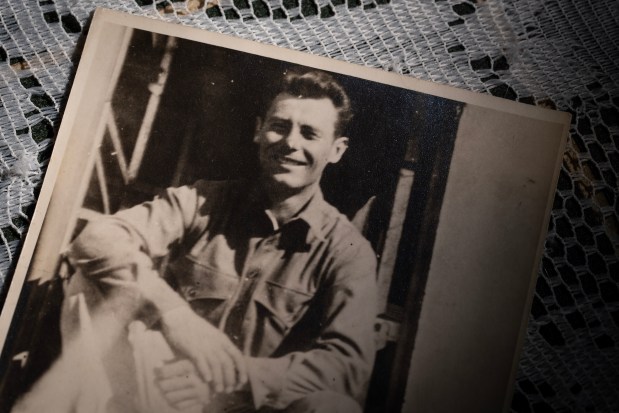
Five months later, he would not be as lucky. On the second day of the invasion of Saipan, on June 16, the Marine was wounded in his right shoulder and ordered to retreat, records show.
But Tuttle would not leave his fellow Marines with Company F, 2nd Battalion, 6th Marines, 2nd Marine Division. Instead, he brought more ammunition to the front lines while still under enemy fire. Then he went back again.
“He then courageously, with disregard for his own safety, directed the fire of our tanks against the enemy until receiving a second wound which forced him to be evacuated,” according to a citation signed by Marine Lt. Gen. H. M. Smith, one of America’s top commanders in the Pacific during WWII.
News of Tuttle’s bravery reached his hometown, where central Illinois newspapers reported on his combat injuries, including the second incident when shrapnel struck him in the legs.
The battle proved a key victory that allowed the U.S. to launch B-29 bombers directly at Japan’s home islands. Tuttle was promoted to corporal, and his military accolades followed.
He was awarded the Purple Heart that October, and in February 1945 the Marines snapped a photo of him shaking Maj. Gen. Thomas E. Watson’s hand as Tuttle received the Silver Star. The medal was awarded for “conspicuous gallantry and intrepidity in action against enemy forces on Saipan,” according to his records.
Peckham said her father’s dedication to his country and fellow Marines is inspiring.
“The reality of what Dad went through, to know he was actually willing to serve his country, serve his fellow Marines and stay after he’s wounded, it shows you what kind of man he was,” she said. “I imagine he had people die right in front of him. To go back a second time and not retreat, that really takes a truly honorable man. He could have turned and run, but he held his post.”
Civilian life
Delbert Tuttle came home at age 26 after being honorably discharged in November 1945. He had been away for three years.
He moved in with his folks, now in Urbana, then made his way to Chicago. There he met and fell for Lorraine Fellows, who lived next door, according to their daughter.
The young couple married on New Year’s Eve in 1950 and raised their two children in Decatur, where Tuttle worked for A.W. Cash Co. running a turret lathe and other machines. He always wore khakis and his trademark wingtip shoes.
“I was a daddy’s girl when I was little,” his daughter said. “Anywhere my dad went, I had to go.”
Delbert and Lorraine Tuttle never divorced, but the couple began living apart when Peckham was about 8 or 9. She said her parents had “a special love between them” but fought too much to live under the same roof. Still, Peckham said her father was a constant presence in his children’s lives, especially when she began dating. He made her wait until she turned 18.
“He could be fun, but I’ll tell ya, with me being the only girl, oh my Lord,” she said. “He would always say ‘I want to know his name, his address and everything else,’ and he’d have to meet him. And he’d say, ‘If you’re not home when you’re supposed to be, I will find you and pull you out of there by the hair on your head.’ He was a tough cookie.”
In 1962 Tuttle survived another life-threatening event: a head-on collision near Tuscola. The crash was so bad, it made the local news.
“It did everything but kill him,” Peckham said. “It took a year for him to walk all over again.”
She said her father struggled with PTSD, likely dating to his military service, and had a nervous breakdown after the accident.
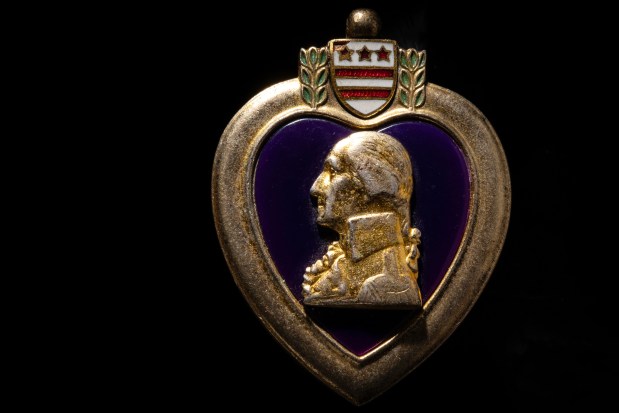
A decade later, on a Sunday afternoon in April 1972, his body was found in his car in the garage of a home he had recently rented in Forsyth. Tuttle had nailed boards across the inside of the locked door. He didn’t leave a note behind. His death was ruled a suicide from carbon monoxide poisoning, according to the coroner’s report. He was 52.
Peckham said her father had been diagnosed with lung cancer. That, coupled with his marital separation and post-traumatic stress disorder, likely led to his decision to take his own life, she said.
Peckham, nearly 19 at the time, was working as a waitress at a local diner when she found out.
“The minute I saw two Macon County sheriffs come up in there and ask for me, I knew he was gone,” she told the Tribune. “Dad had been through so much with the war, the separation and the cancer, it was just too much. I guess he knew there was no way out.
“I wish I could have saved him.”
She said her younger brother, Vincent, then about 16, identified their father’s body. He later told her he knew it was their father before the sheet covering his face was pulled down because he had spotted his father’s wingtip shoes.
“I remember my grandmother Tuttle told me, she said, ‘Honey, your dad went through a lot in the military.’ She said when he came home, really, he didn’t come home the same,” Peckham said. “She said, ‘He left as my son. But he came back different. It really affected him.’”
‘Quite an honor’
A few years ago, Peckham’s cousin in Urbana surprised her with some of her father’s old military photos and records that she didn’t know existed, as well as a few spent shell casings from his military funeral honors.
The cousin got them from her mother, who was Delbert Tuttle’s only sibling. But the Purple Heart and Silver Star were missing.
Peckham said she found out the state had the Purple Heart a while ago after a neighbor heard Tuttle’s name while watching a TV news report about the treasurer’s efforts to return the medals. Peckham said she quickly filed a claim but the situation with her brother, whose name was on the bank safe deposit box, delayed recovery of the medal.
In the meantime, the Tuttle name stayed on the treasurer’s Operation Purple Heart website. The Tribune identified Peckham through family obituaries and, after multiple phone calls to wrong numbers, sent a handwritten letter over the summer that Peckham answered.
The Tribune provided her with about 100 pages from her father’s official military file. The military records came from the National Archives and Records Administration in St. Louis.
Then, shortly before Veterans Day, Peckham had her dad’s Purple Heart back again. Her son, Vincent, 47, also attended the private ceremony. Frerichs, who was joined by state Rep. Sue Scherer, a Decatur Democrat, told Peckham her father was part of the Greatest Generation and “was a hero to our country.”
“I’ve been waiting a long time for this,” Peckham tearfully responded. “I will never forget this moment for the rest of my life. It’s quite an honor.”
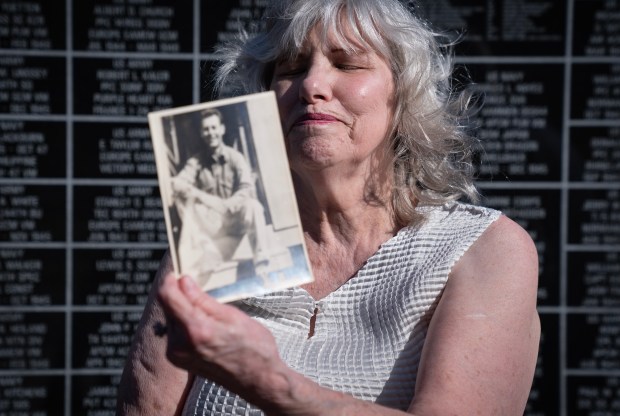
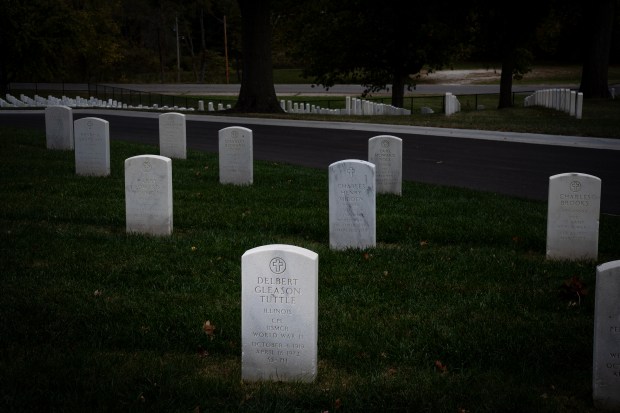
Later, at her home, she told the Tribune: “I wish he could have been standing beside me to receive it. I know he was with me in spirit, but I miss his presence so much.”
She placed the Purple Heart in a jewelry box, then stored it in a locked glass curio cabinet in her dining room. Her mother’s ashes sit atop the cabinet, and a framed photo of Jesus adorns the wall behind it.
Peckham still is searching for her father’s missing Silver Star, which was not in the bank deposit box. And she hopes the Marines will give her another American flag, as she said the one presented to her family at her father’s 1972 funeral service was stolen in a burglary.
Her dad is buried at Camp Butler National Cemetery in Springfield alongside other Illinois military heroes. At the bottom of his tombstone, the initials “SS-PH” alert passersby to all Tuttle accomplished — and sacrificed — for his country.
Anyone with information about a Purple Heart return is urged to contact the Illinois Treasurer’s Office at claimantconnect@illinoistreasurer.gov. For more information, visit operationpurpleheart.org.
cmgutowski@chicagotribune.com


